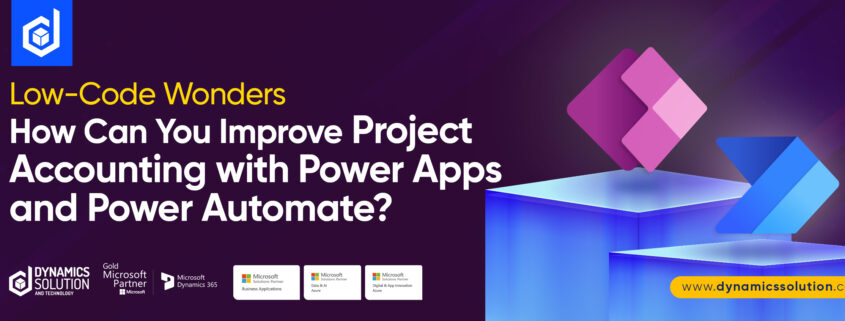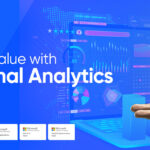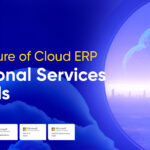Streamlined financial protocols i.e., efficient project accounting is the backbone of successful projects. However, the project management landscape is a volatile domain due to the multitude of unforeseen factors threatening to dismantle project stability. Employing fail-safe project accounting strategies can help teams mitigate project risks and save project profitability from taking a huge hit.
In today’s hyper-digital world, integrating digital tools is the only way forward to make processes efficient and resilient. Unfortunately, employing run-of-the-mill accounting software flooding the market does not cut it anymore. With increased turbulency, project managers need to adapt to intelligent, AI-enabled tools that can elevate accounting practices. Employing intelligent strategies for efficient project accounting empowers project managers to take proactive approaches instead of reactive.
This blog dives deep into how the Power Automate and Power Apps, as intelligent and low-code tools, can help finance managers streamline project accounting.
How Do Low-Code Tools Power Like Automate and Power Apps Come in the Picture?
Understandably, where there is coding involved, non-technical business professionals are bound to be daunted. Microsoft’s mission, in recent years, has been to bridge the gap between non-technical professionals and digital business processes. Previously, businesses were dependent on standalone legacy applications for their CRM and ERP processes. This required a whole IT team to carry out the processes smoothly and yet it was impossible to integrate these applications to other data sources and to customize them.
The Power Platform was designed to aid in Microsoft’s mission of bridging this gap and empowering non-technical business professionals to build smart business processes right out of their Office 365 applications. It eradicates small business’ dependency on IT teams and enables them to extend, build and customize their business processes in a highly cost and time-efficient manner.
Both Power Automate and Microsoft Power Apps are part of the Power Platform but are distinct in their core capabilities. Power Apps allows business users to develop custom applications for custom business requirements through a vast array of services, connectors, and robust development environments. Whereas Power Automate is a cloud-based tool that allows automation of manual and repetitive workflows across many business applications and services. These workflows are triggered by various actions and conditions and can aid in freeing up users from redundant tasks.
Let us discuss how these revolutionary tools can expedite project accounting and empower project managers to streamline and fool-proof their accounting processes.
Invoice Processing
Invoice processing is labor-intensive but tends to be smartly automated. Power Automate can be utilized to automate invoice processing which can free project managers from a repetitive task. Text classification models can be utilized in Power Automate to set up an invoice processing workflow, which can extract the information from all electronic invoices as soon as they are entered into the system. A convenient integration with scanners can also be set up for converting physical invoices into digital copies, for further processing. Automation for this process can also mitigate the chances of human errors which can negatively affect the entire accounting process.
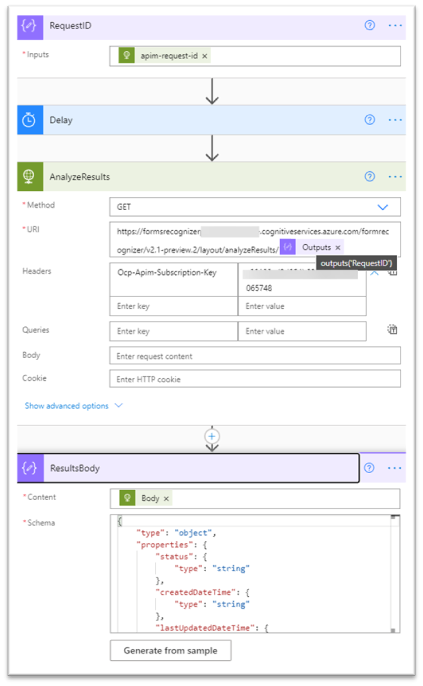
Moreover, Power Apps can be employed to set up an application for invoice reviewing and approval, with a user-friendly interface. If the invoice data is clearly displayed, managers will have to spend less time reviewing the invoice information and hence the review and approval loop can be significantly shortened and cashflow will be accelerated.
Expense Reporting
Tracking expenses is a tedious yet important task and its efficacy can be enhanced by making it real-time through Power Apps. A custom application can be built to track, record, verify and review expenses, indirect or direct, as per the project need. Its mobile application can be utilized by employees for remotely adding expenses and the managers to review and track them in real-time. The Microsoft Power Apps already comes with a built-in Expense Report template which can be used to build the application which can be customized later by inputting a few lines of code.
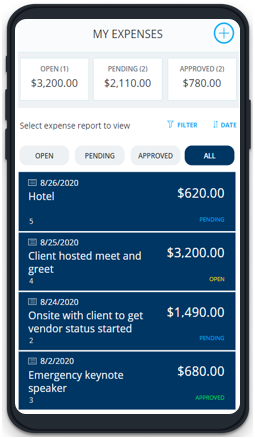
The custom application, built through Microsoft Power Apps can be integrated with Power Automate to automate the expense approval through project managers. A push notification can be set up to be sent to relevant users for expense approval which can be trigger for the data to be automatically entered into the accounting system. This can mitigate managers from missing expense approval and subsequent data entry.
Project Reporting
Projects can generate a lot of financial data which can be processed to drive actionable insights. A workflow can be set up in Power Automate which can send data from an accounting system to Power BI for data visualization and real-time intelligent reporting. This can be utilized for weekly or milestone-based project performance reviews and strategy reformations. Automated real-time analytics from Power BI can help project managers conduct in-depth reviews and keep the project on track towards original goals and objectives.
Microsoft Power Apps can be employed for creating custom dashboards which can provide data-driven insights into priority KPIs for projects. This unified view of project KPIs can allow project managers to keep track of project budgets, resource allocation and project profitability which can help managers take prompt decisions from data-driven insights.
Benefits of Employing Power Platform for Your Project Accounting
The Power Platform can turn organizations into data-driven enterprises which put their data to effective use like building business process applications, automation, driving actionable insights and strategies, without any extensive IT teams. According to a Forrester survey, the Power Platform can yield 140% ROI and decrease their application development costs by 45%, due to the three major benefits of Power Platform:
- Organizations can leverage the enhanced scalability of low-code solutions by employing the Power Platform.
- Organizations can effectively remove barriers from citizen development by leveraging an increased impact of low-code with enterprise-grade security.
- The traditionally high maintenance costs of application development and maintaining legacy ERP and CRM can be significantly reduced.
Partner with Dynamics Solution and Technology for Elevated Accounting Practices
Now that citizen development is not a far-fetched concept anymore, it is high time to data-enrich your organizational processes with the Power Platform. Partnering with a Microsoft-vetted Solutions and Gold partner like Dynamics Solution and Technology can help you leverage the endless benefits from the get-go. Our never-ending commitment to technical excellence aids in the data-driven digital transformation of organizations around the Gulf, MENA, and European regions.
Contact us today to begin your data-driven digital transformation with Microsoft Power Platform!

